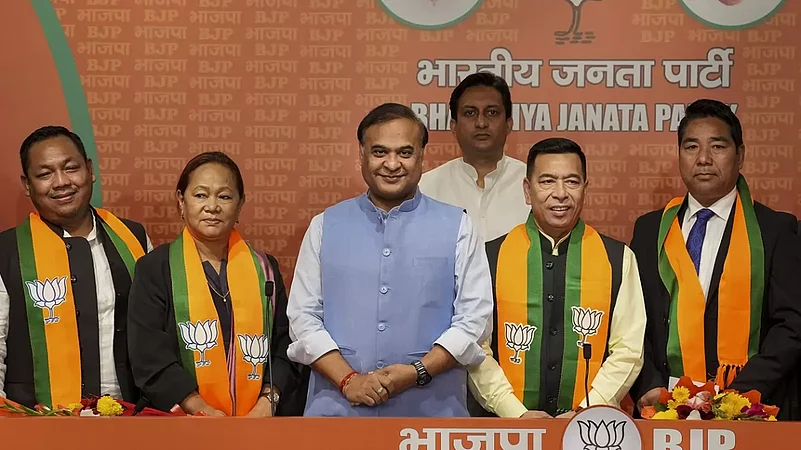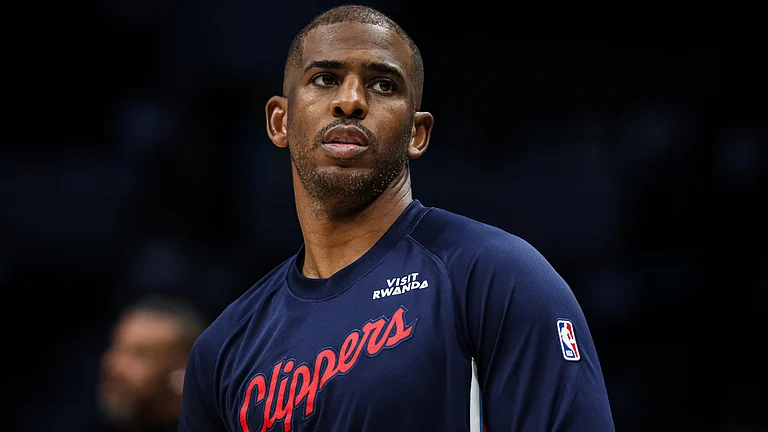The Election Commission of India (EC) on Wednesday announced the poll schedule for three northeastern states. While the states of Nagaland and Meghalaya will go to polls on February 27, Tripura will conduct then polling on February 16. Results are set to be announced on March 2. In all three states, the saffron party is in power. BJP is the ruling party in Tripura and it is also part of the ruling coalition in Nagaland and Meghalaya.
On the day of EC's announcement of Meghalaya polls dates, five MLAs from different parties, including a minister, resigned from the state Assembly to join the small regional outfit United Democratic Party (UDP). This new development of MLAs jumping ship to the UDP has generated curiosity for the upcoming elections that is largely seen as a contest between Chief Minister Conrad Sangma’s National People’s Party (NPP) and Mamata Banerjee’s Trinamool Congress (TMC).
As election dates near, political waves in the three states seem to be intensifying. Home Minister Amit Shah’s visit to Nagaland on January 6 has reignited political debates in the state which has been an Opposition-less government since last year. Tripura and Meghalaya, which are also going for polls, have witnessed a series of actions and activities in the states in the past year, however, Nagaland has been relatively silent and subdued in the absence of any opposition. All major parties now seem to be gearing back up after the declaration of the election schedule.
A day after Shah's visit, the state’s apex tribal body, the Naga Hoho, issued a statement questioning the “sincerity and habitual rhetoric of the government of India with regard to the Indo-Naga political settlement”. Over a year ago, all Nagaland parties had come together on a joint platform to seek a solution to the Nagaland problem. The United Democratic Alliance (UDA) government in Nagaland has the Nationalist Democratic Progressive Party (NDPP), BJP, and two Independent MLAs as partners, along with the Naga People’s Front (NPF) joining hands with this pact.
Another interesting factor is the common number of seats/constituencies which is 60 in the three northeastern states in which political parties and candidates will be contesting the elections.
NAGALAND: An Opposition-Less Democracy, Politics Of AFSPA
The NDPP, the BJP, and the Naga People's Front are members of the ruling coalition --- the United Democratic Alliance (UDA) (NPF). Neiphiu Rio, a member of the NDPP is the current and ninth Chief Minister of the state. Rio is also the longest-serving Nagaland CM having completed almost three tenures now.
In Nagaland, the NDPP-BJP coalition that was created before the 2018 elections is still going strong in the absence of any opposition. The UDA has 21 NPF MLAs. The NPF won 26 seats in 2018, the NDPP 18, the BJP 12, the NPP two, the JDU one, and one seat went to an Independent.
For the 2023 elections, the BJP intends to run candidates in 40 additional seats and contest 20 of them itself. BJP secured 12 seats in 2018. But the Nagaland BJP recently suffered a setback when three of its district presidents defected and allied themselves with the Janata Dal (United).
By dividing the state's 16 districts into seven tribes, "Frontier Nagaland," a separate state has been vociferously demanded by the tribes. In an effort to find a solution, the central government recently met with the Eastern Nagaland People's Organisation (ENPO). The saffron party also believes that the Armed Forces (Special Powers) Act (AFSPA) may also partially play in their favour as the state has historically resisted the Act.
There have been several dramatic changes since the 2018 elections. In 2021, the NPF and Independents joined the NDPP-BJP alliance to seek a collective solution to the Nagaland problem. However, the debate over the NDPP and BJP alliance in poll contests is on a 40:20 seat-sharing basis. Alongside parties, pressure has been mounting from the Naga National Political groups (NNPGs) that have accused the state BJP of “playing with fire” by going ahead with elections without an acceptable political settlement.
NNPGs is the joint banner of seven armed Naga outfits that joined the peace talks after renewed negotiations between the Union government and the NSCN (IM), the state’s largest rebel group, in 2015. Formal talks are said to have concluded in October 2019, but a final agreement has not been arrived at. A redundant tussle continues over the NSCN (IM)’s demand for a separate Naga national flag and constitution. The ruling alliance has, however, mostly played down the pressure.
“Everybody wants a solution, but that will depend on the negotiating parties, not the general public, which can only put pressure. Even the 60 members (MLAs), who are facilitators, are putting pressure. We are working with everybody. But the outcome will depend on the negotiating parties,” Chief Minister Neiphiu Rio was quoted saying recently as per an Indian Express report. He added that not going ahead with elections would result in a “constitutional crisis” and a “law and order problem”.
MEGHALAYA: A Case Of Deflecting Allies, Questions Of A New Front?
The state-level Meghalaya Democratic Alliance led by the National People's Party (NPP) is a post-poll alliance that won a majority of seats in the 2018 Meghalaya Legislative Assembly. However, the alliance will not be contesting the 2023 Assembly Elections unitedly as NPP decided to go solo and other parties also declared to contest alone or in a small regional alliance in one or more constituencies
Only six seats were won in the 2018 election by the UDP, which the defecting MLAs have now joined. The Hill State People's Democratic Party (HSPDP), the People's Democratic Front, Conrad Sangma's National People's Party (NPP), the Bharatiya Janata Party (BJP), and the UDP are also a component of the Meghalaya Democratic Alliance (MDA) government (PDF).
20 NPP legislators, 2 BJP lawmakers, 9 UDP legislators, including the speaker, and 2 PDF members make up the majority MDA. There are 41 members of the assembly, including the eight members of AITC's opposition. The BJP, which had just established itself in the state, ran for 47 of the 60 seats in 2018 and won two. The coalition has failed, with all constituents opposing the upcoming election while some remain in the administration.
Notably, the NPP, which was given national party recognition in 2019, leads a coalition government in Meghalaya with the UDP as its major member. The North East Democratic Alliance, which is led by the BJP, includes the NPP as well (NEDA).
Since November 2021, up to 19 Meghalayan legislators have defected, with Congress legislators dominating the list. The remaining 17 of its 21 MLAs defected from the party after three of them died and another joined the NPP. When 12 of them, led by former chief minister Mukul Sangma, "merged" with the TMC in November 2021, the Mamata Banerjee-led party quickly became the main Opposition in the state.
The admission of the Congress's Dozen allowed TMC to finally gain ground in the state with a Christian majority. However, four eventually left the TMC to join other parties. A select few other parties, like the NPP, also lost their MLAs to other organizations, like the BJP.
In the meantime, Salen Sangma, the lone representative of the Nationalist Congress Party (NCP) in the 60-member Meghalaya assembly, last week joined the Congress party. The Chief Minister is Conrad Sangma of the National People's Party (NPP). The United Democratic Party (UDP) has eight seats, the People's Democratic Front (PDF) has two, the BJP has two, and the NPP has twenty. There are 9 seats for the opposition TMC.
Who else joined Mukul Sangama as a member of Congress? There are fourteen empty seats. The Congress won the most seats in the Meghalaya assembly election of 2018, although its total of 21 seats was not enough to fill half of the chamber's 60 seats.
With assistance from the BJP, the NPP became the state's new administration. Conrad Sangma was appointed as the new CM of the state. Recently, rifts between the NPP and the BJP appeared. In a spur-of-the-moment response, Sangma had said that his party would contest every seat on its own in 2023. In further developments, two NPP MLAs joined the saffron party after leaving the NPP.
During the 2018 elections, the BJP only won two seats. However, this time, the party hopes to head the coalition administration. The members of the coalition are attempting to patch things up. High hopes are pinned on the North East Democratic Alliance (NEDA) convenor, Himanta Biswa Sarma, who defected from the grand old party to the BJP in 2015, to strengthen the bonds between the allies.
TRIPURA: Demand For New Statehood Amid Election Announcements
Breaking the long-left dominance in the state, BJP won 33 seats in the 2018 elections, the Indigenous People's Front of Tripura (IPFT) four, the CPM 15, and the Congress one. Six seats were open. Biplab Deb was appointed as the new Chief Minister but the party was forced to oust him in May 2022 over performance concerns, and Dr Manik Saha was then appointed as the next CM.
The National Democratic Alliance (NDA) is in power in the state, with BJP heading this alliance along with IPFT since March 9, 2018.
The relationship between the BJP and its primary ally, the tribal organization Indigenous Peoples Front of Tripura (IPFT), has been strained. Union Home Minister, Amit Shah's recent visit to the state aimed to resolve these concerns and launch open the Jana Vishwas Yatra to rally support for the party.
On the other hand, the Left and the Congress have united in Tripura to defeat the BJP, after a similar attempt during the West Bengal elections in 2021 which had been an unsuccessful stint.
A list of candidates from the BJP was also made public for 54 of the state's 60 seats, leaving five open for the IPFT, which ran on nine of those seats in the previous election. On Saturday, the Bharatiya Janata Party (BJP) and the Indigenous Peoples Front of Tripura (IPFT) decided to continue working together for the forthcoming state elections.
The Tipraha Indigenous Progressive Regional Alliance (TIPRA) Motha's chief Pradyot Kishore Deb Barma urged the party to combine with them as political rumours swirled around the IPFT's intended course of action. The IPFT contested the Lok Sabha polls and the panchayat polls in 2019, and the district council polls in 2021 alone despite being a part of the BJP-led coalition government in Tripura.
"We participated in the 2018 assembly elections together and established the administration. For the 2023 assembly elections, our partnership would remain in place", the chief minister Manik Saha declared. There are now 36 members of the BJP and 4 members of the IPFT in the state assembly.
Deb Barma tweeted in response to the partnership saying, "All the IPFT leaders are shockingly not picking up their phones! Since 11 am, I've been expecting to hear from them! It appears that Operation Lotus has begun. He continued by saying that IPFT supporters were now endorsing his party.
The IPFT ran for office in the most recent elections with the demand for Tipraland, a separate state for the area's indigenous population. The BJP has stated that it does not support the demand. "For the past five years, the IPFT has been with us. We never brought up Tipraland with them. And we oppose the Greater Tipraland demand," stated BJP state president Rajib Bhattacharya.


























